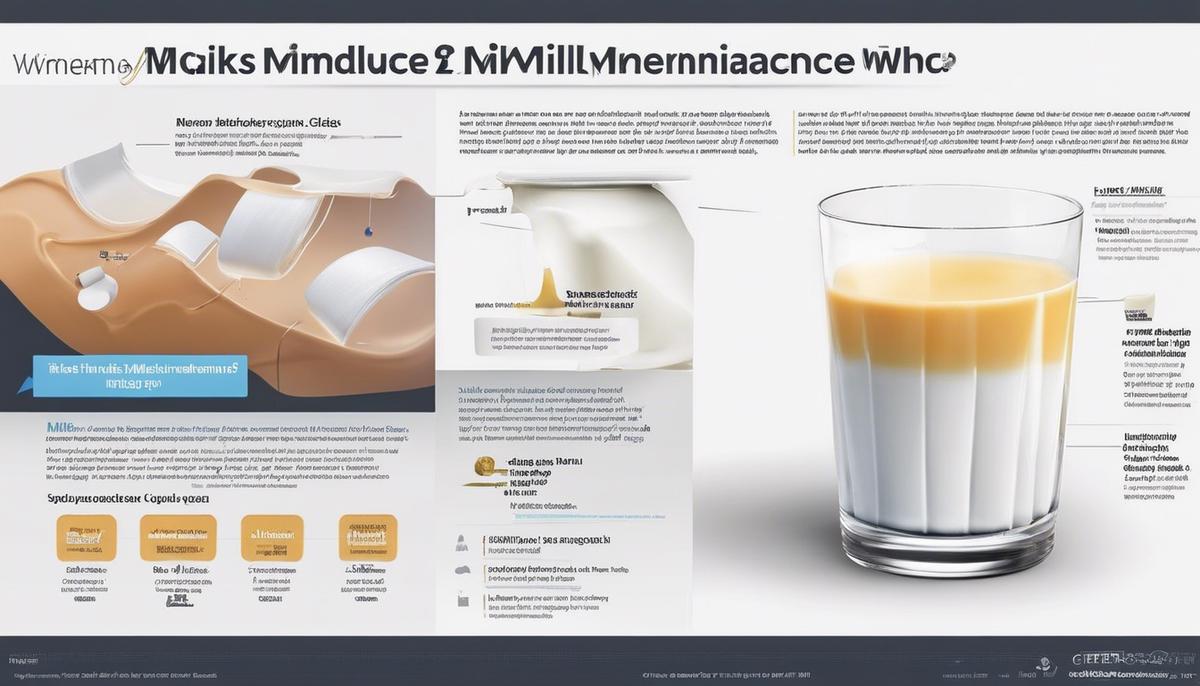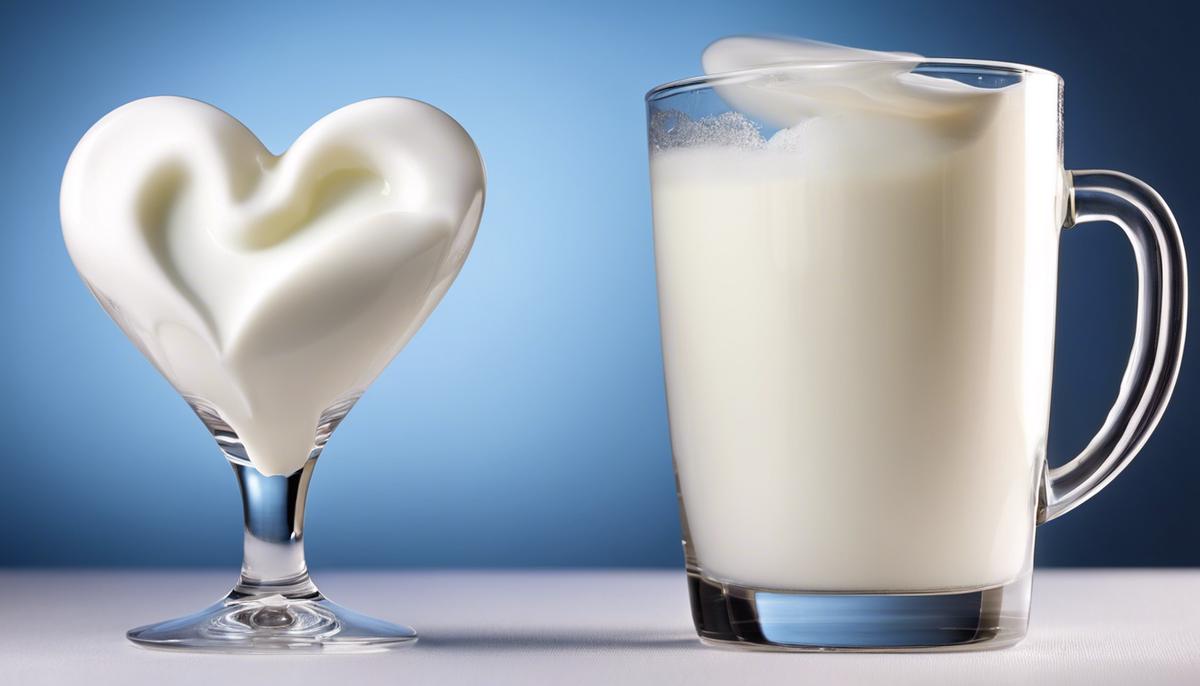

Agridisk
Egypt - Alexandria

Milk | Nutrition facts & Health benefits health benefits of milk
Description: Milk has long been heralded as a staple of a nutritious diet, revered for its rich symphony of macronutrients that cater to our body's needs. From the frothy cap on your morning latte to the splash over your favorite cereal, milk pervades our daily rituals with its complex nutritional profile. As we delve into the macronutrient treasury of milk—where lactose carbohydrates, casein and whey proteins, and a medley of fats reside—we uncover the pivotal roles each plays in fueling and nurturing the human body. Beyond the macros, we encounter an array of vitamins and minerals, such as the bone-fortifying calcium, the sunshine vitamin D, essential potassium, and the energy-catalyzing B vitamins. These nutrients conspire to fortify our physiological needs and support intricate metabolic pathways. This essay aims to unfurl the nutritional tapestry of milk, exploring its contribution to human health and dissecting the science behind its benefits and potential concerns. Milk stands as a quintessential source of vital macronutrients, serving as a fundamental dietary component for various populations around the globe. The prominent macronutrients within milk encompass carbohydrates, mainly in the form of lactose, proteins, including both casein and whey fractions, and fats that are present as milk fat globules. Each of these nutrients plays a pivotal role in maintaining the structure and function of the human body, promoting growth, and ensuring overall well-being. The carbohydrate component, lactose, not only serves as a critical energy source but also aids in the absorption of calcium, magnesium, and phosphorus—minerals essential for the development and maintenance of healthy bones and teeth. On the protein front, milk proteins are renowned for their high-quality, encompassing all essential amino acids necessary for human nutrition. Casein accounts for approximately 80% of milk protein, providing a slow-release amino acid profile, while whey protein represents 20%, known for its rapid digestibility and abundance of branched-chain amino acids (BCAAs). Proteins in milk facilitate tissue repair and are integral to the body’s enzymatic and hormonal functions. Furthermore, milk fat includes a diverse array of fatty acids, both saturated and unsaturated, which are vital for cellular functions, hormone production, and the absorption of fat-soluble vitamins A, D, E, and K. Conjugated linoleic acid, a type of fat found in milk fat, is of particular interest for its potential health benefits, including anti-carcinogenic and anti-inflammatory properties. While full-fat milk provides these fats in higher quantities, fat-modified versions of milk, such as low-fat or fat-free, provide similar protein and carbohydrate content with reduced calorie intake. Such modifications cater to varying dietary needs and preferences without compromising the availability of the aforementioned essential macronutrients. Calcium stands as the cornerstone for healthy bone development and maintenance, representing the primary mineral found in bones and teeth. Our bodies require it for vascular contraction, muscle function, nerve transmission, and intracellular signaling. Being the most abundant mineral in milk, calcium's presence is pivotal, especially when one considers its synergy with vitamin D, another micronutrient present in fortified milk. Vitamin D facilitates the intestinal absorption of calcium, buttressing bone mineralization, assisting in cell growth modulation, and sustaining immune functions. In addition, the B vitamins in milk, such as riboflavin (B2), vitamin B12, and niacin (B3), are an assembly of biochemical catalysts that propel energy production from ingested food and support the maintenance of optimal neural and blood cell health. Riboflavin is instrumental in the conversion of food into fuel, while vitamin B12 preserves the health of red blood cells and nerve tissue. Niacin, on the other hand, aids in metabolic processes that are essential for the generation of energy within cells. The intimate interplay of these micronutrients upholds a robust immune response and nurtures cognitive function, cardiovascular health, and more—a testament to milk's seamless integration of nourishment across a spectrum of bodily systems. Milk's influence extends beyond its mere macronutrient content, seeping into the foundational aspects of bone health owing to its rich repository of calcium and vitamin D. Calcium serves as the bedrock of skeletal strength and integrity, playing a critical role in processes of bone growth and remodelling throughout human life. Sufficient intake of calcium is essential for preventing osteoporosis, a condition marked by diminished bone density and heightened fracture risk. Vitamin D, often fortified in milk, acts as a vital co-factor, augmenting intestinal calcium absorption, and ensuring that the benefits of dietary calcium are fully actualized within the bony structures of the body. Furthermore, the presence of B vitamins exemplifies the multifaceted role that milk consumption can play in human health. Riboflavin, or vitamin B2, functions as a coenzyme in oxidative reactions crucial for cellular energy release. Vitamin B12 is indispensable for the production of red blood cells and the maintenance of neurological function, deficits of which can precipitate anemia and neuropathies. Niacin, or vitamin B3, is integral to numerous metabolic pathways, including those involved in energy production and DNA repair. This bevy of B vitamins thus weaves a tapestry of nutritional support that extends to the immune system, fortifies cognitive function, and may even imbue protective effects to cardiovascular health by influencing homocysteine levels, implicated in vascular disease. In summation, milk is not a mere beverage; it is a vehicle for nutrients vital for human physiology, from its vast macronutrient profile to the synergistic action of calcium, vitamin D, and B vitamins. Understanding milk's role in health requires a comprehensive appreciation of its nutritional constituents and the biological systems they uphold. As we thread through the wealth of scientific research and the rivers of cultural practice, the narrative of milk as a nutritional resource is both comprehensive and contentious. The journey through its creamy depths reveals a juxtaposition of undeniable benefits and complex health implications. Through the lens of current studies and clinical expertise, we have navigated the rich waters of milk's influence on bone density, heart health, and its role in a balanced diet amidst the whirlpools of lactose intolerance and dietary diversity. Armed with this knowledge, we find ourselves at the crossroads of dietary choices, each path lined with individual health considerations and informed by the rich tapestry of nutritional evidence that milk, in its myriad forms, offers us. Milk has long been heralded as a staple of a nutritious diet, a veritable fountain of health brimming with essential nutrients critical for the human body. Within its creamy embrace, lies a complex nutritional composition that goes beyond mere refreshment. We embark on an exploration of milk’s nutritional landscape, where proteins, fats, and carbohydrates are the terra firma on which a rich ecosystem of vitamins and minerals thrive. These nourishing constituents form the foundation for robust health, contributing to various bodily functions and suggesting that a glass of milk may be more than just a comforting beverage—it's a cornerstone of daily nutrition. Milk, a cornerstone of human nutrition since the advent of animal domestication, remains a subject of considerable scientific interest due to its complex composition and the myriad of roles it plays in human health. Among its constituents, essential nutrients stand out for their indisputable contributions to physiological functions. Protein in milk, particularly casein and whey, is of high biological value, with a comprehensive profile of essential amino acids indispensable for tissue repair, growth, and enzymatic processes. The carbohydrate lactose not only provides an immediate source of energy but also aids in the absorption of calcium and magnesium. Speaking of minerals, milk is remarkably rich in calcium, which is foundational for the maintenance and development of strong bones and teeth, while magnesium contributes to muscle function and metabolic health. Phosphorus, another mineral in milk, is essential for cellular structure and energy storage. Furthermore, milk contains a suite of B vitamins such as riboflavin, B12, and niacin, which participate in energy metabolism and the maintenance of healthy nerve cells and red blood cells. Vitamin A, vital for immune competence and vision, and vitamin D, instrumental in calcium metabolism and bone health, are also present, either naturally or through fortification. The synergistic interaction between these nutrients in milk underpins its status as a valuable dietary component in promoting overall health. The nexus between milk consumption and bone density is further strengthened by the bioavailability of its constituent nutrients that are efficacious in forestalling the insidious progression of osteoporosis. Calcium uptake by the body is a critical operation, and milk's facilitators for calcium absorption are noteworthy, particularly vitamin D. Not merely a bystander, this fat-soluble vitamin is instrumental in augmenting the intestinal assimilation of calcium and promoting its deposition into the bone matrix. It serves as a coadjuvant in maintaining phosphorus levels as well -- a meticulous balancing act essential for optimal bone mineralization. Without the contribution of bioactive vitamin D, the skeletal system's integrity could be compromised, rendering it susceptible to the bone-thinning disease, osteoporosis. Moreover, the interrelated mechanisms of bone remodeling demonstrate a further dimension of milk's impact on osteoporotic prevention. The continuous physiological process of bone renewal relies upon the osteoblasts and osteoclasts – the respective artisans of bone formation and resorption. The proteins and minerals pervading in milk supply the required substrates for osteoblasts to construct the osteoid matrix and subsequently mineralize it, yielding a sturdy bone framework. Simultaneously, by nurturing peak bone mass earlier in life and advocating for the maintenance of bone density, milk consumption indirectly modulates the activity of osteoclasts, potentially decelerating bone loss with advancing age. Consequently, milk is not just a source of nutritional sustenance but an ally in the preservation of skeletal vigor. It is through these multifaceted biochemical interactions and the meticulous orchestration of mineral homeostasis facilitated by milk's nutrients that one can appreciate its substantial role in bone health. Reminding ourselves that osteoporosis is apt to an insidious onset, regular milk intake forms a dietary bulwark, critical for both the prevention and mitigation of this condition. Through a commitment to dietary strategies embedding milk and its nutritional constituents, society can better equip itself to confront the challenge of osteoporosis with resilience. The integral function of milk in muscle maintenance can be substantially attributed to its hydration properties. The fluid component of milk, being of considerable volume, serves not only as a carrier of essential nutrients but also importantly aids in maintaining hydration status which is critical for muscular performance and recovery post-exercise. Adequate hydration ensures proper electrolyte balance and muscle function, facilitating contraction and reducing the risk of cramps, which are crucial for both the growth and the maintenance of muscle tissue. Furthermore, the lipid constituents of milk contribute to muscle health in a less direct yet significant manner. Dietary fats present in milk are critical for the absorption of fat-soluble vitamins and provide essential fatty acids necessary for numerous bodily functions, including the synthesis of hormones such as testosterone, which plays a pivotal role in muscle growth and maintenance. While not immediately linked to muscle protein synthesis, these fatty acids support the overall metabolic environment conducive to muscle health. Moreover, a broader perspective reveals that milk provides a harmonious blend of macro- and micronutrients, each serving a role that underpins muscle homeostasis. The milieu of its components does not act in isolation but in concert, presenting milk as more than a simple sum of its parts. In this regard, milk's nutrients collectively support an anabolic environment, reinforcing the physiological preconditions required for muscle function, growth, and recovery, thereby underscoring its role as a beneficial component in the diet of individuals aiming to support their muscular health. Milk has long been associated with a spectrum of health benefits that extend beyond bone fortification. Rigorous scientific inquiry provides substantive evidence on its protective effects against certain diseases. In the context of cardiovascular health, various studies explicate the link between milk's components and a lower risk of hypertension. The peptides derived from the enzymatic breakdown of milk proteins possess angiotensin-converting enzyme (ACE) inhibitory action, which plays a pivotal role in blood pressure regulation. This mechanism underscores a prospect for milk's consumption in managing and potentially curtailing the onset of hypertension, a critical determinant of cardiovascular diseases. Emergent research posits that the regular intake of milk correlates with a diminished risk of metabolic syndrome which encompasses a cluster of conditions, including increased blood pressure, high blood sugar, excess body fat around the waist, and abnormal cholesterol levels that elevate the risk for heart disease, stroke, and diabetes. Constituents within milk such as conjugated linoleic acid and omega-3 fatty acids, coupled with an inherent synergistic nutrient profile, are conjectured to modulate lipid metabolism and insulin sensitivity. However, these assertions must be carefully weighed against individual dietary tolerances and the broader nutritional context within which milk is consumed. Despite milk's manifold potential health benefits, discernment is requisite concerning its inclusion in various diets. It is imperative to contemplate lactose intolerance and milk protein allergies that may preclude the consumption of cow's milk for a subset of the population. Conversely, fermentation processes and the exploration of plant-based alternatives have widened the gateway to similar nutritional advantages. Additionally, milk should not be viewed as a panacea for disease prevention but rather as one element within a holistic approach to health that calls for a varied and balanced diet, regular physical activity, and prudent lifestyle choices. Hence, the empirical evidence illumines milk's contributory role in disease prevention within the boundaries of a comprehensive dietetic framework. As we have waded through the scientific rivers that carve out milk’s topography in the world of health and wellness, we are left with a nuanced understanding of its role in our diets. Milk emerges as a multifaceted contributor to our well-being, supporting bone strength, muscle health, and potentially providing a bulwark against an array of chronic conditions. While health landscapes continue to shift and scientific dialogues ebb and flow, the enduring image of milk remains largely as a significant drop in the ocean of our nutritional needs. It's clear that, across various life stages and amidst the fluctuating tides of health recommendations, milk maintains its relevance and its revered place at the table.Milk | Nutrition facts & Health benefits
Nutrition facts of milk
Macronutrients in Milk

Vitamins and Minerals in Milk
Milk is not only a remarkable source of macronutrients but also an essential font of micronutrients, vital for myriad physiological functions. Among these are calcium, vitamin D, and B vitamins, which together orchestrate a symphony of benefits for skeletal integrity, metabolic efficiency, and overall wellbeing.

Health Implications of Milk Consumption


Health benefits of milk
Nutritional Composition of Milk

Milk and Bone Health

Milk's Impact on Muscle Growth and Maintenance

Milk in Disease Prevention
